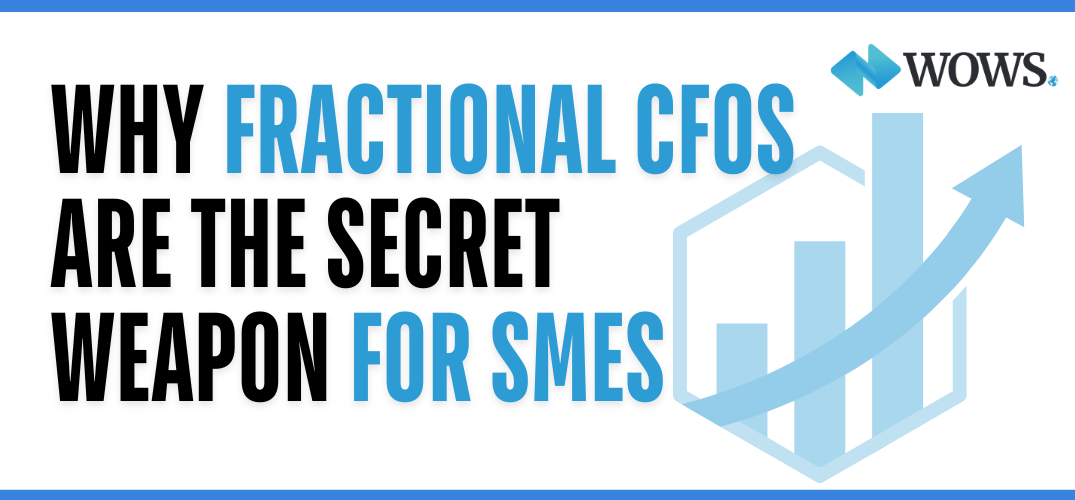Startups: The Ultimate Guide to Term Sheets - Part 4
Term Sheet Startup Ultimate Guide to Term Sheets

The importance of a term sheet cannot be underestimated. Any founder who is being offered funding from a professional investor or venture capital firm will find a term sheet attached.
While the thought of receiving those much-needed funds will naturally excite you, it is imperative that before final acceptance you understand exactly what the terms involved are and what you are committing to.
Because of this, WOWS Global is putting down a 4-part series on exactly what term sheets are and why they are so important.
In part 4 we will look at how founders can become smart negotiators, details of red flag clauses to be aware of, and a selection of the most important terms to negotiate on.
We will also give some final thoughts as well as explain why smart startup founders should seek experienced, professional assistance before, during, and after any term sheet discussions.
Founders - Here’s how to be a Smart Term Sheets Negotiator
It cannot be stressed enough just how important an accepted term sheet is to founders. The need to understand what terms are key to your company is a crucial aspect of the term sheet negotiation process.
Having a clear idea of what terms you want, those that may be acceptable, and any you cannot accept is an absolute must. The reason for stating this is that if you are not careful and do not have full knowledge of what is being offered there could well be certain terms that are not in your or the company’s best interests.
Before starting the negotiation process you must have a clear view of what any deal-makers, as well as any deal-breakers, are. Your goal should be to create a win-win situation for you, your company, and the said investor(s).
Always keep in mind that the term sheet(s) offered form the basis of a long-term investment agreement and this should go hand-in-hand with a healthy long-term investor relationship.
To help you become a smart term sheet negotiator here are some important best practices to follow.
Achieving these will put you a long way to establishing a productive and fruitful investor relationship while securing the best terms possible for you as a founder and for your company.
#1 - Plan Ahead
Securing an investor's term sheet is a major goal for the vast majority of startups. This does not mean you should accept the first offer that comes along. Familiarizing yourself with what term sheet negotiation is all about will give you and your company a noticeable advantage.
It will pay founders to plan for various scenarios in advance. Doing so will allow you to make faster, more informed decisions on what is being offered.
Founders should also focus on clarity and transparency throughout the funding process because this is key to developing a productive investor relationship.
#2 - Learn and Fully Understand Common Term Sheet Clauses
Classing this as a best practice may seem obvious to many. However, fully understanding the common (and not so common!) terms and clauses in a term sheet is invaluable.
In the first instance, having such knowledge will impress potential investors. Secondly, it will put you in a position of strength during term sheet negotiations.
#3 - Go for Multiple Term Sheets
While it may not always be possible, founders should take the time to attract multiple investors. Achieving this and obtaining multiple term sheets gives you significant leverage over an offered single investor term sheet.
If you do get to the stage of being offered multiple term sheets these should ideally come in around the same time. Why? Because it will allow you to compare these offers against each other before beginning investor negotiations.
#4 - Make Due Diligence a Two-Way Street
Founders should always be aware that the role of a chosen investor will be fundamental to the development of their company. This means in-depth research must be carried out.
Do not just establish how much funding potential investors are willing to invest. Instead, think of the due diligence process as a two-way street.
#5 - Red Flags - Be Alert!
This relates to best practice #2. Founders must have complete knowledge of what they (and their advisors!) see as being term sheet red flags. Having this insight will help you to identify them and raise your concerns with the investor(s) involved.
That means you need to carefully read between the lines of any term sheet to avoid red flags. As will be seen below, there are a number of clauses that you will want to forcibly push back on.
This is because it is often the case that red flags are excessive provisions stated in legal documents. If accepted by a founder these will result in overly favorable terms for preferential investors and be to the detriment of founders as well as common shareholders.
It should be noted that agreeing to a term sheet that includes negative and potentially damaging terms and clauses simply because you have not fully understood the implications is no excuse. It is also very unlikely that you will be able to go back and make revisions.
Below we list some of the top red flags that should be avoided during term sheet negotiations
Protective provisions
Founders need to fully understand any protective provisions included in a term sheet. These provisions can affect such things as limiting the amount of debt you can have without investor consent, putting restrictions on increasing authorized shares (e.g. to take on new funding or the ability to issue shares to employees), and through the addition of revisions to your certificate of incorporation.
Full ratchet anti-dilution clause
Founders MUST take this one seriously. If a full ratchet anti-dilution clause is included in your term sheet it can mean that common shareholders significantly suffer in a down round.
A down round happens when the valuation of a company decreases in consecutive funding rounds. This makes a broad-based weighted average agreement the most founder-friendly, second in line is a narrow-based weighted average.
Participating preferred stock
Partition rights lean heavily in favor of preferred stockholders. Founders should view such a clause as non-standard. This means they can make a case against its inclusion during negotiations.
Liquidation preference
Anything above a 1x liquidation preference should be viewed as overly aggressive. Here is an example of how damaging it can be to founders and common stockholders; if the preferred stock has a liquidation preference of 2x, this is a guarantee that preferred investors get double their money back and this is before common stockholders receive anything.
Dividends - Cumulative and PIK (Paid In Kind)
Let’s look at each in turn. In essence, cumulative dividends guarantee investors a return. Founders of early-stage startups should not view this as standard and negotiate against it.
As for PIK dividends, these increase liquidation preference for those holding preferred stock and over time will dilute a founder’s control.
When negotiating dividends, founders should view the term “non-cumulative” as being the most friendly.
On top of these red flags, make sure you have a complete understanding of valuation and dilution clauses. Double-check to ensure no clause mentions undisclosed changes in management, and anything stating that there are guaranteed exits and milestones which need to be met to ensure funding.
These are not the only potential red flags to keep an eye out for. Discussing red flag issues with a well-informed startup advisory company is the way to go.
By avoiding such clauses you will be positioned to get the best deal out of your funding round while also eliminating certain clauses that could have damaging consequences.
The Most Important Terms to Negotiate are…
The most important points to negotiate will vary depending on the situation your company is in but there are some general term sheet clauses you should focus on.
Here are 5 worthy of note:
Valuation
While valuation is very important to founders it should not be all-consuming. What is more important is that you secure the right type of investor(s). Achieve this and it will prove to be more important than going for the highest possible valuation offered.
Again, a sensible valuation means you can grow in a structured and defined way. Too high a valuation is putting unnecessary pressure on your startup to perform (often in shorter timescales than your informed forecasts).
Before approaching investors, founders should assess their company’s PMV (Pre-Money Valuation). Having a clear idea of what you see as the PMV ahead of any investment will help you to decide the amount you are willing to sell.
Stock issuance - Preferred vs. Common
During term sheet negotiations it is very important to agree on how the stock will be issued and how these rights are allocated. This needs to be balanced as fairly as possible.
Liquidation preference
While it will not be planned for, founders need to be aware that their business could come in at a lower value than expected. The liquidation preference clause is a protective provision. This means that during negotiations founders should try and negotiate for a non-participating liquidation preference.
Anti-Dilution provisions
Negotiate anti-dilution provisions carefully. They protect investors from losing money should your company sell stock at lower prices than that which the investor(s) originally paid.
Board of directors representation
Founders should seek a balanced board of directors with a fair representation between their company and the investors. This makes it very important to negotiate the terms and conditions that allocate investor seats on the board.
To achieve this founders must carry out investor due diligence. Doing so will help to decide on the most supportive investors (and their industry contacts). Founders also need to be aware that giving too much board control to investors could see them lose their company!
After Signing, Some Deals Will Fail
The startup world is full of uncertainties and this means that many types of deals struck can miss their mark. Founders need to be aware that this can happen during any stage of the process.
It should never be assumed that a fantastic valuation is equal to a great term sheet. What that means is you need to work hard to create a win-win situation for you, your startup, and the investors involved.
Concentrate on keeping requests and negotiations in line with your current industry situation as well as what stage of development your company is at. By balancing your expectations and not falling short of expectations given or accepted you are greatly increasing your chances of success.
Final Thoughts & Why Founders Should Reach out for Assistance
That is it for the final part of the comprehensive 4-part series from WOWS Global on the Ultimate Guide to Term Sheets
To access part 1, part 2, and part 3 of this guide, simply click on the relevant part.
Reach out for Essential Assistance
Unless you are a serial entrepreneur with multiple startup successes behind you it is not recommended to proceed with term sheet negotiations alone. Rather, you should seek expert and experienced advice from a well-established and proven startup advisory company.
WOWS Global is one such company. We offer founders the benefit of our vast experience in the startup world. Our mission is to provide smart startup founders with sensible advice and clear explanations of everything a term sheet represents.
WOWS has also put in place a state-of-the-art online digital ecosystem that is second to none. It offers 24/7 access and is designed to keep everything a startup founder requires in one secure place.
Taking advantage of the WOWS services will allow secure access and the sharing of relevant, sensitive information with authorized investors as well as other relevant parties. We also offer you access to data rooms that can be used during due diligence procedures when closing large funding rounds.
The comprehensive services that WOWS Global offers include all of the above and a whole lot more.
Any founder who would like to discuss things further should reach out to us for an initial no-obligation discussion at:
Related Posts
-

Term Sheet Ultimate Guide to Term Sheets <em>Term Sheet Negotiation(s)</em> Startup & Venture Capital
Term Sheet 101 (2025 Edition): Clauses, Red Flags, and Negotiation Tactics
A fast, founder-friendly breakdown of the clauses that matter in 2025 liquidation preferences, anti-dilution, pro-rata, ESOP, board, and information rights, plus negotiation do’s/don’ts and model scenarios. Close your next round with clean terms and fewer surprises. -

Startup Startup Growth Founder Health Habits
Startup Growth and the Surprising Power of Sleep: What the Data Says About Founder Health Habits
Forget the hustle myth. Founders who sleep smarter, not less, are scaling faster. The data reveals surprising links between sleep, wellness, and startup success. -

Financial mistakes startup Fractional CFO
Financial Mistakes That Hurt Businesses—Startups & SMEs Alike
Many startups and SMEs unknowingly make financial mistakes that hurt profitability, cash flow, and long-term success. From misinterpreting cash in the bank to scaling without financial planning, these pitfalls can be costly but avoidable. Discover the most common financial mistakes and how to fix them in this guide by WOWS Global. -

Startup MVP Lean Startup Feedback
The MVP: Turning Bare Bones Into Billion-Dollar Dreams (Or a Glorified Prototype)
The MVP (Minimum Viable Product) is your scrappy, bare-bones version of your grand vision. Learn how to strike the right balance between too minimal and too polished while preparing for an MVP launch in this startup guide. -

Southeast Asia Startup Ecosystem
Exploring Southeast Asia's vibrant Startup Ecosystem
Southeast Asia is home to a bustling startup ecosystem that is rapidly evolving and capturing the attention of investors and entrepreneurs alike. With its thriving economies, growing middle-class population, and increasing internet and smartphone penetration rates, the region offers immense potential for innovation and business growth. -

Term Sheet
5 Red Flags in Term Sheets That Every Founder Should Be Aware Of
A term sheet is a non-binding agreement that outlines the basic terms of an investment deal. It’s like a blueprint for the actual contract that will follow if both parties agree to move forward.
